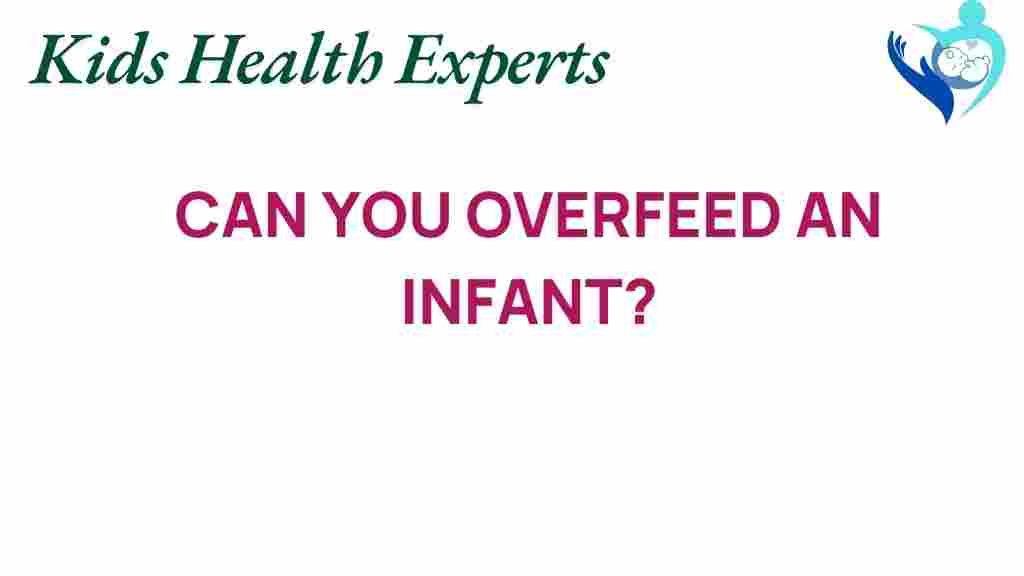The Hidden Risks: Can You Overfeed an Infant?
As new parents, understanding infant nutrition is crucial for the healthy development of your baby. One common concern among parents is whether it is possible to overfeed an infant. While the instinct to nourish your child is natural, it is essential to recognize that overfeeding can lead to various health issues. In this article, we will explore the signs of overfeeding, feeding guidelines, and how to ensure your baby’s health aligns with growth milestones. We will also provide parenting tips and pediatric advice to help you navigate the world of infant care.
Understanding Infant Nutrition
Infant nutrition is vital for the growth and development of your baby. A well-balanced diet during the first year of life lays the foundation for a lifetime of health. Infants require specific nutrients to support their rapid growth, and understanding their dietary needs can prevent issues related to overfeeding.
Key Nutrients for Infants
Infants primarily need the following nutrients:
- Protein: Essential for growth and development.
- Fats: Crucial for brain development and energy.
- Carbohydrates: The main energy source that fuels growth.
- Vitamins and Minerals: Important for various bodily functions and immune support.
Breast milk or formula provides all the necessary nutrients for infants in the first six months. After this period, parents can gradually introduce solid foods while continuing to provide breast milk or formula.
Feeding Guidelines for Infants
To ensure your baby receives the right amount of nutrition without the risk of overfeeding, follow these feeding guidelines:
1. Recognize Hunger Cues
Infants communicate their hunger through various cues. Watch for signs such as:
- Rooting or turning their head toward your hand.
- Smacking their lips or making sucking noises.
- Putting their hands to their mouth.
Responding to these cues promptly can help prevent overfeeding. Waiting for your baby to show signs of hunger is crucial.
2. Follow the Timely Feeding Schedule
Newborns typically feed every 2-3 hours. As they grow, the frequency may decrease. It’s important to:
- Feed on demand, rather than adhering strictly to a schedule.
- Allow your baby to determine the amount they need.
3. Monitor Baby’s Growth Milestones
Regular pediatric check-ups will help monitor your infant’s growth milestones. If your baby is gaining weight appropriately and meeting developmental milestones, it is likely they are not being overfed.
4. Avoid Force Feeding
Force feeding can lead to negative associations with food and potential overeating habits later in life. Instead, let your baby eat until they show signs of fullness, such as:
- Turning their head away from the bottle or breast.
- Closing their mouth or showing disinterest.
The Risks of Overfeeding an Infant
Overfeeding can lead to several health risks, including:
1. Obesity
One of the most significant risks associated with overfeeding is childhood obesity. Research indicates that overfeeding in infancy can predispose children to obesity later in life.
2. Gastrointestinal Issues
Overfeeding can lead to discomfort, gas, and other gastrointestinal problems. Signs include:
- Excessive spitting up or vomiting.
- Colic or prolonged crying after feeding.
3. Poor Feeding Habits
Establishing a healthy relationship with food is essential. Overfeeding can make it difficult for infants to recognize their hunger and fullness cues, leading to poor eating habits as they grow.
Troubleshooting Overfeeding Concerns
If you’re concerned about overfeeding your infant, consider the following tips:
1. Keep a Feeding Log
Tracking feeding times and amounts can help you identify patterns. This can provide valuable information to discuss with your pediatrician.
2. Consult Your Pediatrician
If you notice signs of overfeeding or have concerns about your baby’s nutrition, consult your pediatrician for personalized advice. They can provide tailored recommendations based on your baby’s growth and health.
3. Educate Yourself on Feeding Practices
Stay informed about best practices in infant care. Resources such as The American Academy of Pediatrics can provide valuable guidelines on infant nutrition and feeding practices.
Conclusion
In summary, while the desire to nourish your infant is natural, it is essential to understand the risks of overfeeding. By following appropriate feeding guidelines, recognizing hunger cues, and monitoring growth milestones, parents can provide their babies with the nutrition they need without the pitfalls of overfeeding. Remember, the journey of parenting involves learning and adapting; seeking pediatric advice and staying informed about infant care will contribute significantly to your baby’s health and well-being. For more parenting tips, check out our resources on infant care and nutrition.
By being proactive and attentive, you can ensure a healthy start for your baby while fostering a positive relationship with food that will last a lifetime.
This article is in the category Nutrition and created by KidsHealthExperts Team
